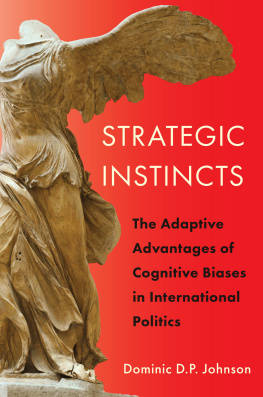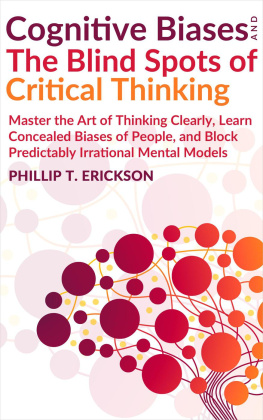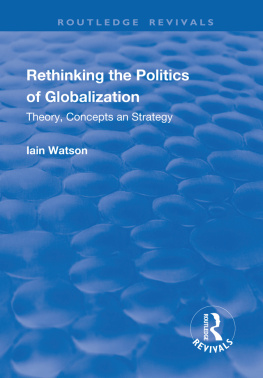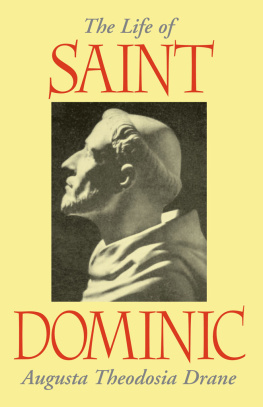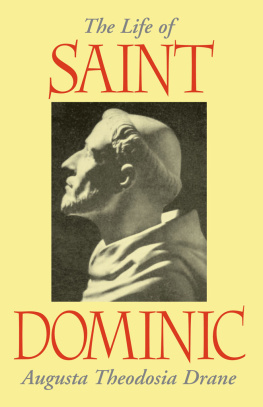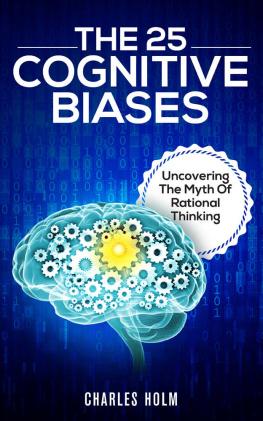STRATEGIC INSTINCTS
Princeton Studies in International History and Politics
G. JOHN IKENBERRY, MARC TRACHTENBERG, WILLIAM C. WOHLFORTH, AND KEREN YARHI-MILO, SERIES EDITORS
For a full list of titles in the series, go to https://press.princeton.edu/series/princeton-studies-in-international-history-and-politics
Strategic Instincts: The Adaptive Advantages of Cognitive Biases in International Politics, Dominic D. P. Johnson
Divided Armies: Inequality and Battlefield Performance in Modern War, Jason Lyall
Active Defense: Chinas Military Strategy since 1949, M. Taylor Fravel
After Victory: Institutions, Strategic Restraint, and the Rebuilding of Order after Major Wars, New Edition, G. John Ikenberry
Cult of the Irrelevant: The Waning Influence of Social Science on National Security, Michael C. Desch
Secret Wars: Covert Conflict in International Politics, Austin Carson
Who Fights for Reputation: The Psychology of Leaders in International Conflict, Keren Yarhi-Milo
Aftershocks: Great Powers and Domestic Reforms in the Twentieth Century, Seva Gunitsky
Why Wilson Matters: The Origin of American Liberal Internationalism and Its Crisis Today, Tony Smith
Powerplay: The Origins of the American Alliance System in Asia, Victor D. Cha
Economic Interdependence and War, Dale C. Copeland
Knowing the Adversary: Leaders, Intelligence, and Assessment of Intentions in International Relations, Keren Yarhi-Milo
Nuclear Strategy in the Modern Era: Regional Powers and International Conflict, Vipin Narang
The Cold War and After: History, Theory, and the Logic of International Politics, Marc Trachtenberg
Liberal Leviathan: The Origins, Crisis, and Transformation of the American World Order, G. John Ikenberry
Worse Than a Monolith: Alliance Politics and Problems of Coercive Diplomacy in Asia, Thomas J. Christensen
Politics and Strategy: Partisan Ambition and American Statecraft, Peter Trubowitz
The Clash of Ideas in World Politics: Transnational Networks, States, and Regime Change, 15102010, John M. Owen IV
Strategic Instincts
THE ADAPTIVE ADVANTAGES OF COGNITIVE BIASES IN INTERNATIONAL POLITICS
Dominic D. P. Johnson
PRINCETON UNIVERSITY PRESS
PRINCETON & OXFORD
Copyright 2020 by Princeton University Press
Requests for permission to reproduce material from this work should be sent to permissions@press.princeton.edu
Published by Princeton University Press
41 William Street, Princeton, New Jersey 08540
6 Oxford Street, Woodstock, Oxfordshire OX20 1TR
press.princeton.edu
All Rights Reserved
Library of Congress Cataloging-in-Publication Data
Names: Johnson, Dominic D. P., 1974- author.
Title: Strategic instincts : the adaptive advantages of cognitive biases in international politics / Dominic D.P Johnson.
Description: Princeton, New Jersey : Princeton University Press, 2020. | Series: Princeton studies in international history and politics | Includes bibliographical references and index. |
Identifiers: LCCN 2020011549 (print) | LCCN 2020011550 (ebook) | ISBN 9780691137452 (hardback) | ISBN 9780691185606 (ebook)
Subjects: LCSH: International relationsPsychological aspects. | International relationsDecision making. | StrategyPsychological aspects. | United StatesHistoryRevolution, 17751783. | Munich Four-Power Agreement (1938) | World War, 19391945CampaignsPacific Area.
Classification: LCC JZ1253 .J65 2020 (print) | LCC JZ1253 (ebook) | DDC 327.01/9dc23
LC record available at https://lccn.loc.gov/2020011549
LC ebook record available at https://lccn.loc.gov/2020011550
Version 1.0
British Library Cataloging-in-Publication Data is available
Editorial: Bridget Flannery-McCoy and Alena Chekanov
Production Editorial: Nathan Carr
Jacket/Cover Design: Pamela L. Schnitter
Production: Erin Suydam
Publicity: Kate Hensley and Julia Hall
Jacket/Cover Credit: The Nike of Samothrace, goddess of victory. Rhodian marble statue, ca. 190 BC. From Rhodes, Greece / Erich Lessing / Art Resource, NY
For Gabriella
ACKNOWLEDGMENTS
THIS BOOK began a long time ago. The utility of strategic instincts is not always obvious and not always immediate, and I am glad that I seized the strategic opportunity to sign a contract with Princeton University Press when I was still at the Princeton Society of Fellows way back in 2007. The reason the book took so long has often puzzled me, but observant others have helpfully chalked it up to a marriage, two children, three transatlantic moves, four jobs, five schools, being at sixes and sevens over the books structure, eight houses, and the decision to write another book in the middle (dont do that). All this makes me even more grateful than usual to the press, to colleagues, to friends, and most of all to family who must have wondered when (or if) this would ever see the light of day and I would stop claiming I was working on it.
Despite my overconfidence, I knew Id get it done eventually. My sincere appreciation goes to all three editors who stuck with me throughout: Chuck Myers, for seeing the light in the original idea; Eric Crahan, who guided and advised at several International Studies Association conferences over the years, in cities across America; and Bridget Flannery-McCoy, who has, somehow, made me finish. Thanks are also due at the Press to Alena Chekanov for her patience and terrific organization, Nathan Carr for expertly seeing the book through production, and to Jennifer Backer for her thorough and brilliant copyediting of what became a very long argument. A special thank you also to my illustrations researcher, Erica Martin, who found things I thought might never be possible, and with incredible efficiency and speed at the eleventh hour.
Although it now seems in the dim and distant past (although still with a warm glow), I thank the Society of Fellows and the Woodrow Wilson School of Public and International Affairs at Princeton University, where this book was conceived and took shape. Thank you to my bosses and supporters there, especially Anne-Marie Slaughter, Leonard Barkan, Michael Wood, Mary Harper, Simon Levin, and all the fellows. I am also grateful to the Department of Government at Harvard University, where I spent a wonderful year working on the book, and especially to Stephen Peter Rosen and Richard Wrangham for their guidance, insight, and good company.
Having moved back to the United Kingdom, I thank colleagues first at the University of Edinburgh, particularly Elizabeth Bomberg and the late John Peterson, who so warmly welcomed me and a young family into a wonderful social and intellectual community in Scotland. I was helped by many colleagues there, especially Mark Aspinwall, Roland Dannreuther, Cecil Fabre, Ian Hardie, Charlie Jeffery, Juliet Kaarbo, Sean Molloy, Glen Morangie, Andrew Neal, and Susan Orr, among too many to name.
At Oxford, among numerous colleagues in the Department of Politics and International Relations and beyond, I thank especially Richard Caplan, Janina Dill, Louise Fawcett, Liz Frazer, Todd Hall, Andrew Hurrell, Eddie Keene, Desmond King, Neil MacFarlane, Walter Mattli, Kalypso Nicolaidis, Andrea Ruggeri, and Duncan Snidal for their help and support. I also thank my brilliant research students, who have in fact inspired and taught me: Robert Bognar, Stuart Bramwell, Laura Courchesne, William James, Jordan Mansell, Christine Pelican, Zoey Reeve, Paola Solimena, Silvia Spodaru, Adrienne Tecza, and Sara Usher. At St. Antonys College, immense thanks are due to Roger Goodman, Margaret MacMillan, and all the fellows and staff for their constant backing and a home from home. I also owe a special thanks to Lord John Alderdice, Annette Idler, Rob Johnson, Sir Hew Strachan, and Peter Wilson at the Changing Character of War Centre in my alma mater Pembroke College, who have provided so many opportunities to engage in strategic thinking at Oxford, and with remarkable people from beyond the ivory tower.


